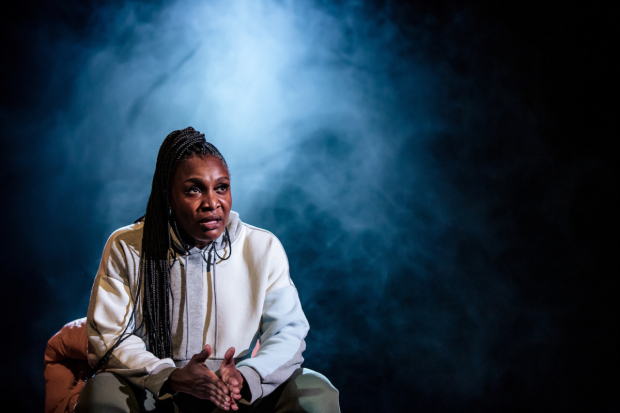The Sun, the Moon, and the Stars (Theatre Royal, Stratford East)

© The Other Richard
On the day after I saw The Sun, the Moon, and the Stars, English footballers were once again booed for taking the knee to highlight racial injustice, which many of its
own players suffer. The fact that such a small gesture against racism can cause so much anger, highlights the need for theatre, as a standard bearer for change, continuing to talk about the death of people because of the colour of their skin.
If Dipo Baruwa-Etti's new play seems to plough familiar ground it is because not enough is changing and not enough is understood. Rage and sorrow both power this
monologue in the mouth of Femi whose twin brother Seun has died at the hands of racist thugs who objected to him having a white girlfriend. His ghost has started to come to sit at the foot of her bed, demanding justice more primal and immediate than that which is about to be dealt out in a London court room.
Written in verse, part poem, part rap, it feels like a cross between a Greek tragedy where one bereaved woman cries for justice to an unfeeling universe, and a more contemporary monologue where the details of London life and British society combine to thwart Femi's righteous anger and hurt.
It is an ambitious brew to carry off, and the weight of its concerns sometimes over-topples it. In plot and motivation terms, it never really fulfils any kind of mission: the killing seems to have happened in Margate but that is never explored. Seun's girlfriend Lexi is a character crying out for explanation. Some of the best moments – Femi's interactions with her girlfriends, her memories of dancing with her brother – are the lighter ones, but Baruwa-Etti seems to feel that lingering here too long will undermine his serious purpose. The opposite would be true. The characters he brings to the stage
need more room to breathe.
What the play does have, however, is an astounding performance from Kibong Tanji and a powerhouse production from Nadia Fall, which sets her amidst Peter McKintosh's box-like set, with a lacquered black wall behind her that recedes backwards as the action progresses. The sides are split with crosses, slashes that are both a reminder of the violence all around, and the semi-religious undertones of her mission for revenge.
She's also searching for understanding, struggling her way towards the pinpricks of light that she finds in the stars. Oliver Fenwick's dramatic lighting design, Tingying Dong's soundscape and most of all Dannielle ‘Rhimes' Lecointe's movement direction all help her on her way, but it is Tanji's performance that holds the entire piece together.
She has an ability to convey fury and grief in a single sentence, switching her mood with
consummate skill, finding the beats and shades of the language and the emotion. I loved the way that she conveys Femi's confusion, her sense that her entire world has been destroyed by a single act of malice. The concluding vision of her brother is deeply moving.










